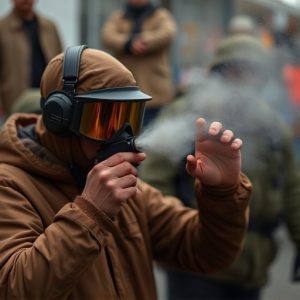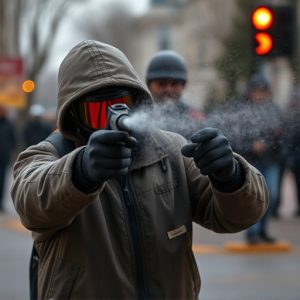Can Pepper Spray Cause Temporary Blindness? An In-Depth Analysis
Pepper spray is a self-defense tool that uses capsaicinoid agents similar to oleoresin capsaicin fo…….
Pepper spray is a self-defense tool that uses capsaicinoid agents similar to oleoresin capsaicin found in chili peppers. When it comes into contact with the mucous membranes of the eyes, it induces intense pain, profuse tearing, and swelling, potentially causing temporary blindness by impairing vision. This disorienting effect can incapacitate an attacker without leading to permanent harm. The spray's effectiveness depends on factors like wind conditions, distance from the target, and the amount of spray used. It operates by binding to nerve receptors, causing a reaction that triggers pain signals and leads to the eyes closing reflexively. Vision usually recovers quickly after exposure, but the immediate effects can be debilitating. It's crucial to use pepper spray responsibly to avoid unintended consequences. Understanding its potent yet temporary impact on vision helps explain how it can serve as an effective self-defense mechanism without causing long-term damage, addressing concerns like "Can pepper spray blind you?"
Pepper spray, a commonly used deterrent against assault and aggression, is designed to incapacitate an attacker by causing intense irritation. Its effects on vision have long been a subject of inquiry, particularly concerning the potential for temporary blindness. This article delves into the capabilities and limitations of pepper spray, examining its impact on eye health and addressing the question: Can pepper spray blind you? We will explore the science behind its effects, factors that influence visual impairment, and the implications for personal protection and safety. Additionally, we’ll consider legal aspects and ethical use, provide guidance on first aid, and compare different types of pepper spray. Through expert insights, case studies, and frequently asked questions, this article aims to shed light on how pepper spray can affect vision and what measures can be taken to mitigate its impact.
Understanding Pepper Spray and Its Impact on Vision
Pepper spray, a commonly used self-defense tool, is a form of capsaicinoid chemical agents that can cause intense irritation upon contact with mucous membranes, including those of the eyes. The compound responsible for its effects is similar to the oleoresin capsaicin found in chili peppers, which triggers a strong reaction when it comes into contact with the eyes. This reaction leads to immediate and overwhelming pain, severe tearing, and swelling that can temporarily impair vision. While the term “blindness” might be an overstatement for the effects of pepper spray, as it does not cause permanent vision loss, it can significantly reduce one’s ability to see under its influence. The intensity of the effect depends on factors like wind conditions, the amount and strength of the spray used, and the proximity to the eyes upon deployment. Users should be aware that while pepper spray is an effective deterrent against attackers, it does not render a person completely unable to see; however, the debilitating effects are often enough to incapacitate an assailant temporarily. It’s crucial for users to understand both the limitations and capabilities of pepper spray in self-defense situations to use it responsibly and effectively.
The Science Behind Pepper Spray's Effects on Eye Health
Pepper spray, a highly effective self-defense tool, contains oleoresin capsicum (ORC), which can cause significant irritation upon contact with mucous membranes, including those of the eyes. The compound responsible for its potent effects is capsaicin, which binds to the same nerve receptors as capsaicin found in chili peppers. Upon deployment, the spray’s fine particles penetrate into the eyes, triggering an intense burning sensation and severe inflammation. This reaction can lead to temporary blindness by incapacitating the victim, as the pain makes it impossible for them to see or respond effectively. The severity of the effects is determined by factors such as wind conditions, distance from the target, and the quantity of spray used.
The science behind pepper spray’s impact on eye health involves understanding how it interacts with the ocular surface. When sprayed, the irritants in the spray cause the epithelial cells in the cornea to release substance P, a neurotransmitter that sends pain signals to the brain. The eyes reflexively close as a protective response to the extreme discomfort, which can last for up to 45 minutes. While recovery is typically swift and full vision can be regained, the intense reaction can temporarily impair visual function, effectively causing a form of temporary blindness. It’s crucial to note that while pepper spray can cause significant temporary disability, it does not necessarily lead to permanent damage or blindness if used as directed and with caution. Proper handling and storage are essential to ensure safety and prevent misuse.


